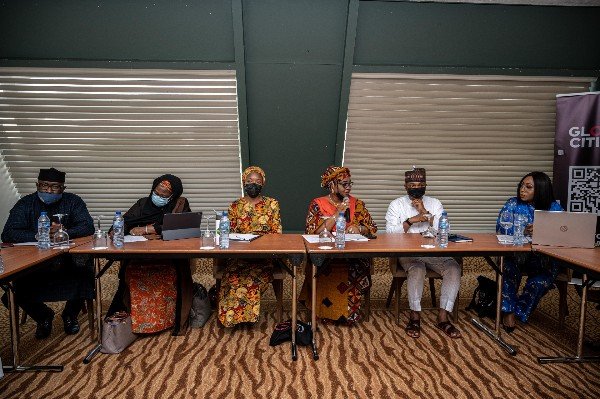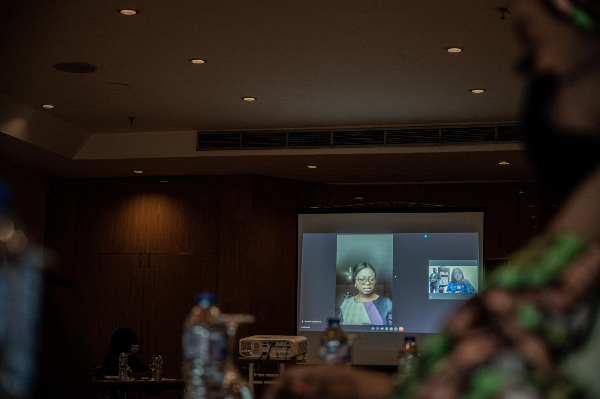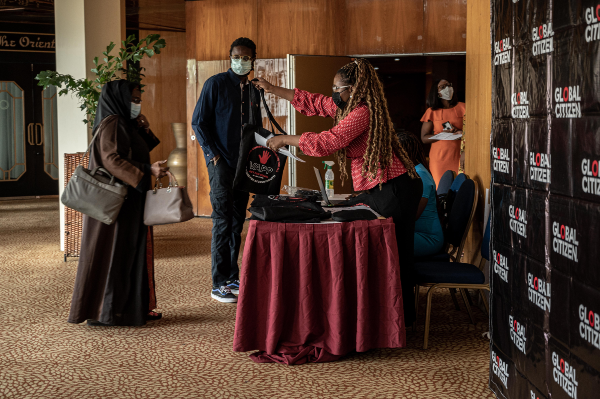On Dec. 8, 2021, the voices of over 23,000 Global Citizens were heard by Nigerian leaders at a high-level roundtable organised by Global Citizen in Abuja, Nigeria. Throughout the year, thousands of Global Citizens across the world have signed a petition calling for the full domestication and implementation of the Violence Against Persons Prohibition (VAPP) Act.
Briefly, bringing in the VAPP Act across all of Nigeria’s 36 states would mean that women and girls in the country are shielded from all forms of violence and survivors obtain justice and adequate compensation.
In 2015, the federal government signed the VAPP Act into law, but there was one major challenge — the law was binding only in the Federal Capital Territory (FCT) unless adopted by each state individually.
Global Citizen launched a petition in 2020, in collaboration with the United Nations Population Fund (UNFPA) as part of the annual 16 Days of Activism Against Gender-Based Violence (GBV) campaign, to call on Nigerian leaders to domesticate this critical piece of legislation across all 36 states.
At the time the petition launched only 17 states had adopted the Act. A year and thousands of signatories later, 30 states have now passed the bill to domesticate the VAPP Act in their respective legislative houses.
As part of Global Citizen’s activities to mark 2021’s 16 Days of Activism Against GBV campaign and close out the petition, activists, government officials, and Global Citizen came together to discuss strategies for the domestication and implementation of the VAPP Act by all of Nigeria’s states.
The roundtable discussion, themed “Action Against Gender-Based Violence: Strategies for the Domestication of the Violence Against Persons (Prohibition) Act by All States in Nigeria”, amplified the calls of thousands of Global Citizens advocating for total domestication of the VAPP Act by states in Nigeria, with a particular focus on the remaining six states.

According to Maimuna Maibe, Global Citizen’s Nigeria Country Director, the event was an indication of how the campaign against GBV is making progress. She also highlighted the fact that it has been a collective effort to get the law passed at the federal level and adopted across all states.
The 2-hour conversation was moderated by Dakore Egbuson, an award-winning performing artist and activist against sexual and gender-based violence (SGBV).
Panelists at the roundtable included the Minister of Women & Social Affairs Dame Pauline Tallen, represented by her Senior Special Assistant, Princess Jummai Idonije; the Secretary General of Women's Right Advancement and Protection Alternative Nigeria (WRAPA), Hajiya Saudatu Mahdi; Senior Special Assistant to the President on SDGs, represented by her Senior Special Adviser, Dr. Bala Yunusa.

Other speakers on the panel were Oluwaseun Osowobi, executive director of Stand to End Rape Initiative (STER) and winner of the 2020 Global Citizen Prize: Nigeria's Hero Award, and Hamzat Lawal, founder of Connected Development (CODE) and BeyGOOD Fellowship Advisory Board Member.
Also in attendance at the roundtable were activists, Kiki Mordi and Aisha Yesufu; industry leaders like Stella Ojekwe-Onyejeli, COO of the Nigeria Sovereign Investment Authority; and civil society organisations like Amnesty International, ONE Campaign, UNFPA, and Nigeria Health Watch.
The cross-section of panelists lends credence to the importance of the VAPP Act in addressing the high incidence of gender-based violence in the country, which has seen a spike since the outbreak of the COVID-19 pandemic last year.
While delivering special remarks, Idonije highlighted the efforts of Minister Tallen, which led to the declaration of the State of Emergency on GBV by the Nigerian Governors’ Forum and the creation of the Inter-Ministerial Committee on Eradication of Sexual and Gender-Based Violence.
“The committee headed by the minister is presently demanding the establishment of special courts specifically for GBV cases, due to the slow pace of the mainstream court processes," she said. Idonije went on to add that the ministry is working to ensure that all states in Nigeria domesticate the VAPP Act by September 2022.
Tosin Akibu, representing the UN Women Representative to Nigeria and ECOWAS (Economic Community of West African States) Comfort Lamptey, provided further insight into some of the past and ongoing interventions to support the fight against gender-based violence.
"When we talk about the opportunities that the VAPP Act can bring to take us several steps in the right direction towards gender equality, it is a blank cheque," she said.
One of the interventions Akibu highlighted is the creation of the National Gender-Based Violence Dashboard — a collaboration with Nigeria’s Federal Ministry of Women Affairs — where cases of gender-based violence are reported and live data is accessible to the public.
Hajia Saudatu Mahdi, Secretary General of WRAPA Nigeria and a member of the Inter-Ministerial Committee on Eradication of SGBV, has been deeply involved in the passage of the VAPP Act in 2015 and its adoption by all Nigerian states.
Speaking at the roundtable, she highlighted major challenges slowing down the pace of domestication and implementation, especially in northern Nigeria. According to Mahdi, some of these barriers include a lack of representation of vulnerable people (in this case, women), socialisation, social apprehension, timely appropriation of laws, and oversight.
Mahdi also affirmed that more than any other thing, understanding the roles of the different agencies and translating the provisions of the bill into lived experiences will help drive funding for implementation of the VAPP Act.
She used the opportunity to highlight the fact that nonprofits are limited in how much they can do for the cause, but a fusion of multi-stakeholder efforts and downplaying individual ownership will help achieve more.
Mahdi also shared an interesting strategy used in one of the states in northern Nigeria, where lawmakers were moved to a different geographical location to be reoriented, while encouraging the use of culture-specific approaches.
In the last couple of years, Osowobi’s Stand to End Rape Initiative (STER) has been at the forefront of the campaign to domesticate the VAPP Act. She shared some of the challenges her organisation has encountered in this process, most of which are religious and cultural practices.
Citing an example from her work in Adamawa State, Osowobi said: “There were issues around men believing that it is okay to chastise their wives and if a woman arrested her husband, she is causing a total separation of the family."
She also condemned the slow pace of government response to issues concerning women and girls, which is evident in the lack of urgency to domesticate the VAPP Act.
She pointed out that the “name and shame” strategy has proven effective in recording more successes because it puts the states that are yet to pass the VAPP Act under pressure to measure up to those that have.

Leveraging his extensive advocacy work in northern Nigeria, meanwhile, Connected Development’s Lawal talked about the importance of politics in the fight to domesticate the VAPP Act and protect millions of Nigerian women and girls.
"Women must play politics if we want to accelerate progress. Imagine if we had a female governor in a state, we don't need to advocate to have her pass the Act or even the budget for its implementation. We can continue to do advocacy but if women do not consolidate and truly invest in politics, we will not make a headway," he said.
The highlight of the roundtable was the official close out of the petition, symbolised by an official hand-over of more than 23,000 signatures received from Global Citizens across the world to the Ministry of Women Affairs.
By lending their voices to call on Nigerian leaders to domesticate the VAPP Act in all 36 states, Global Citizens have helped encourage action from Nigeria’s leaders to protect the future of women’s rights and equality in Nigeria. This is evident in the additional win secured barely 24 hours after the roundtable, with the passage of the VAPP Act at the Borno State House of Assembly.